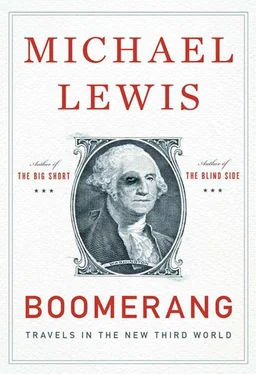Thus began what became a three-hour encounter. I’d ask simple questions—Why on earth would anyone become a monk? How do you handle life without women? How do people who spend ten hours a day in church find time to create real estate empires? Where did you get the crème de menthe?—and he would answer in twenty-minute-long parables in which there would be, somewhere, a simple answer. (For example: “I believe there are many more beautiful things than sex.”) As he told his stories he waved and jumped around and smiled and laughed: if Father Arsenios feels guilty about anything, he has a rare talent for hiding it. Like a lot of people who come to Vatopaidi, I suppose, I was less than perfectly sure what I was after. I wanted to see if it felt like a front for a commercial empire (it doesn’t) and if the monks seemed insincere (hardly). But I also wondered how a bunch of odd-looking guys who had walked away from the material world had such a knack for getting their way in it: How on earth do monks, of all people, wind up as Greece’s best shot at a Harvard Business School case study?
After about two hours I work up the nerve to ask him. To my surprise he takes me seriously. He points to a sign he has tacked up on one of his cabinets, and translates it from the Greek: The smart person accepts. The idiot insists.
He got it, he says, on one of his business trips to the Ministry of Tourism. “This is the secret of success for anywhere in the world, not just the monastery,” he says, and then goes on to describe pretty much word for word the first rule of improvisational comedy, or for that matter any successful collaborative enterprise. Take whatever is thrown at you and build upon it. “Yes . . . and” rather than “No . . . but.” “The idiot is bound by his pride,” he says. “It always has to be his way. This is also true of the person who is deceptive or doing things wrong: he always tries to justify himself. A person who is bright in regard to his spiritual life is humble. He accepts what others tell him—criticism, ideas—and he works with them.”
I notice now that his windows open upon a balcony overlooking the Aegean Sea. The monks are not permitted to swim in it; why, I never asked. Just like them, though, to build a beach house and then ban the beach. I notice, also, that I am the only one who has eaten the pastries and drunk the crème de menthe. It occurs to me that I may have just failed some sort of test of my ability to handle temptation.
“The whole government says they are angry at us,” he says, “but we have nothing. We work for others. The Greek newspapers, they call us a corporation. But I ask you, Michael, what company has lasted for a thousand years?”
At that moment, out of nowhere, Father Ephraim walks in. Round, with rosy cheeks and a white beard, he is more or less the spitting image of Santa Claus. He even has a twinkle in his eye. A few months before, he’d been hauled before the Greek parliament to testify. One of his interrogators said that the Greek government had acted with unusual efficiency when it swapped Vatopaidi’s lake for the Ministry of Agriculture’s commercial properties. He asked Ephraim how he had done it.
“Don’t you believe in miracles?” Ephraim had said.
“I’m beginning to,” said the Greek MP.
When we are introduced, Ephraim clasps my hand and holds it for a very long time. It crosses my mind that he is about to ask me what I want for Christmas. Instead he says, “What is your faith?” “Episcopalian,” I cough out. He nods; he calibrates: it could be worse; it probably is worse. “You are married?” he asks. “Yes.” “You have children?” I nod; he calibrates: I can work with this . He asks for their names . . .
THE SECOND PARLIAMENTARY inquiry into the Vatopaidi affair is still gathering steam, and you never know what it may turn up. But the main facts of the case are not in dispute; the main question left to answer is the motives of the monks and the public servants who helped them. In the late 1980s, Vatopaidi was a complete ruin—a rubble of stones overrun with rats. The frescoes were black. The icons went uncared for. The place had a dozen monks roaming around its ancient stones, but they were autonomous and disorganized. In church jargon they worshipped idiorrhythmically—which is another way of saying that in their quest for spiritual satisfaction it was every man for himself. No one was in charge; they had no collective purpose. Their relationship to their monastery, in other words, was a lot like the relationship of the Greek citizen to his state.
That changed in the early 1990s, when a group of energetic young Greek Cypriot monks from another part of Athos, led by Father Ephraim, saw a rebuilding opportunity: a fantastic natural asset that had been terribly mismanaged. Ephraim set about raising the money to restore Vatopaidi to its former glory. He dunned the European Union for cultural funds. He mingled with rich Greek businessmen in need of forgiveness. He cultivated friendships with important Greek politicians. In all of this he exhibited incredible chutzpah. For instance, after a famous Spanish singer visited and took an interest in Vatopaidi, he parlayed the interest into an audience with government officials from Spain. They were told a horrible injustice had occurred: in the fourteenth century a band of Catalan mercenaries, upset with the Byzantine emperor, had sacked Vatopaidi and caused much damage. The monastery received $240,000 from the government officials.
Clearly one part of Ephraim’s strategy was to return Vatopaidi to what it had been for much of the Byzantine Empire: a monastery with global reach. This, too, distinguished it from the country it happened to be inside. Despite its entry into the European Union, Greece has remained a closed economy; it’s impossible to put one finger on the source of all the country’s troubles, but if you laid a hand on them, one finger would touch its insularity. All sorts of things that might be more efficiently done by other people they do themselves; all sorts of interactions with other countries that they might profitably engage in simply do not occur. In the general picture the Vatopaidi monastery was a stunning exception: it cultivated relations with the outside world. Most famously, until scandal hit, Prince Charles had visited three summers in a row, and stayed for a week each visit.
Relationships with the rich and famous were essential in Vatopaidi’s pursuit of government grants and reparations for sackings, but also for the third prong of its new management’s strategy: real estate. By far the smartest thing Father Ephraim had done was go rummaging around in an old tower where they kept the Byzantine manuscripts, untouched for decades. Over the centuries Byzantine emperors and other rulers had deeded to Vatopaidi various tracts of land, mainly in modern-day Greece and Turkey. In the years before Ephraim arrived, the Greek government had clawed back much of this property, but there remained a title, bestowed in the fourteenth century by Emperor John V Palaiologos, to a lake in northern Greece.
By the time Ephraim discovered the deed to the lake in Vatopaidi’s vaults, it had been designated a nature preserve by the Greek government. Then, in 1998, suddenly it wasn’t: someone had allowed the designation to lapse. Shortly thereafter, the monks were granted full title to the lake.
Back in Athens, I tracked down Peter Doukas, the official inside the Ministry of Finance first accosted by the Vatopaidi monks. Doukas now finds himself at the center of the two parliamentary investigations, but he had become, oddly, the one person in government willing to speak openly about what had happened. (He was by birth not an Athenian but a Spartan—but perhaps that’s another story.) Unlike most of the people in the Greek government, Doukas wasn’t a lifer but a guy who had made his fortune in the private sector, inside and outside of Greece, and then, in 2004, at the request of the prime minister, had taken a post in the Finance Ministry. He was then fifty-two years old and had spent most of his career as a banker with Citigroup in New York. He was tall and blond and loud and blunt and funny. It was Doukas who was responsible for the very existence of long-term Greek-government debt. Back when interest rates were low, and no one saw any risk in lending money to the Greek government, he talked his superiors into issuing forty- and fifty-year bonds. Afterwards the Greek newspapers ran headlines attacking him (DOUKAS MORTGAGES OUR CHILDREN'S FUTURE), but it was a very bright thing to have done. The $18 billion of long-term bonds now trade at 50 cents on the dollar—which is to say that the Greek government could buy them back on the open market. “I created a nine-billion-dollar trading profit for them,” says Doukas, laughing. “They should give me a bonus!”
Читать дальше












